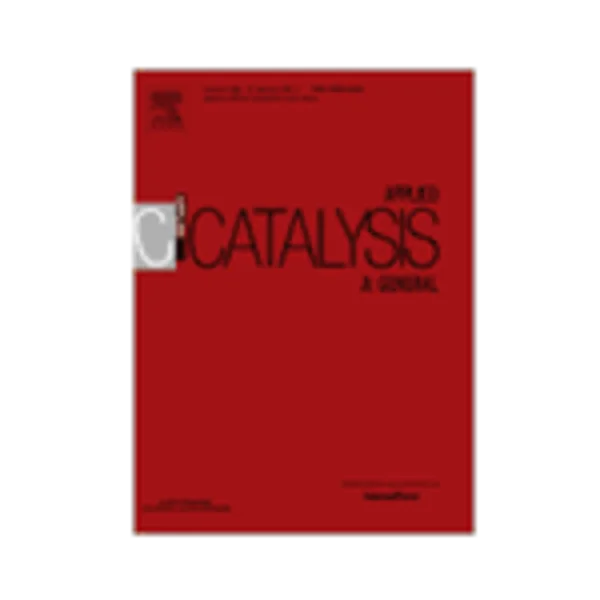-
liquid-phase dehydration of propylene glycol using solid-acid catalysts
جزئیات بیشتر مقاله- تاریخ ارائه: 1392/07/24
- تاریخ انتشار در تی پی بین: 1392/07/24
- تعداد بازدید: 1008
- تعداد پرسش و پاسخ ها: 0
- شماره تماس دبیرخانه رویداد: -
in this work we combine experiments with density functional theory (dft) calculations to investigate the heterogeneous dehydration of propylene glycol. the reactions were carried out with pure, liquid propylene glycol over mfi-framework zeolite catalysts or the mesoporous sulfonic-acid resin amberlyst 36dry. when amberlyst 36dry was used, propylene glycol dehydrated to form propionaldehyde with 77% selectivity. all of the propionaldehyde further reacted with propylene glycol to form a cyclic acetal. the final products consisted of 78% acetal, 13% dipropylene glycol, and the remaining 9% was composed of acetone and a cyclic ketal formed from acetone. the zeolite catalysts demonstrated significantly higher selectivity toward dipropylene glycol compared to amberlyst 36dry. furthermore, the zeolite had a lower conversion to cyclic acetals, improving the selectivity toward c3 products, acetone and propionaldehyde. dft calculations confirmed that propionaldehyde is the favorable product in both catalysts, since it can be formed either through dehydration of the secondary hydroxyl group or via dehydration of the primary hydroxyl group with a concerted pinacol rearrangement. however, in the case of zeolites, the cyclic acetals experience steric hindrance since their size is comparable to that of the zeolite pores. thus we argue that the cyclic acetals produced over the zeolite catalyst were formed homogeneously from the c3 products which diffused out of the zeolite pores.
مقالات جدیدترین رویدادها
-
استفاده از تحلیل اهمیت-عملکرد در ارائه الگوی مدیریت خلاقیت سازمانی و ارائه راهکار جهت بهبود
-
بررسی تاثیر ارزش وجوه نقد مازاد بر ساختار سرمایه شرکت های پذیرفته شده در بورس اوراق بهادار تهران
-
بررسی تأثیر سطح افشای ریسک بر قرارداد بدهی شرکت های پذیرفته شده در بورس اوراق بهادار تهران
-
بررسی تأثیر رتبه بندی اعتباری مبتنی بر مدل امتیاز بازار نوظهور بر نقد شوندگی سهام با تأکید بر خصوصی سازی شرکت ها
-
تأثیر آمیخته بازاریابی پوشاک ایرانی بر تصویر ذهنی مشتری پوشاک ایرانی (هاکوپیان)
-
ویژگی های شهر اسلامی
-
طراحی سیر کولاتور هم صفحه خود بایاس با استفاده از لایه ی ضخیم فریت استرانسیوم
-
بررسی تحلیل رفتار متقابل گیاه و جریان جهت تبیین مبانی مدل ریاضی خسارت کشاورزی
-
synthesis and antimicrobial action of ag-zeolite a
-
oblique water waves impacting on a thin porous wall with a partial-slipping boundary condition
مقالات جدیدترین ژورنال ها
-
مدیریت و بررسی افسردگی دانش آموزان دختر مقطع متوسطه دوم در دروان کرونا در شهرستان دزفول
-
مدیریت و بررسی خرد سیاسی در اندیشه ی فردوسی در ادب ایران
-
واکاوی و مدیریت توصیفی قلمدان(جاکلیدی)ضریح در موزه آستان قدس رضوی
-
بررسی تاثیر خلاقیت، دانش و انگیزه کارکنان بر پیشنهادات نوآورانه کارکنان ( مورد مطالعه: هتل های 3 و 4 ستاره استان کرمان)
-
بررسی تاثیر کیفیت سیستم های اطلاعاتی بر تصمیم گیری موفق در شرکتهای تولیدی استان اصفهان (مورد مطالعه: مدیران شرکتهای تولیدی استان اصفهان)
-
بررسی نهادهای موثر و ارزیابی حاکمیت شرکتی و جایگاه آن در نظام بانکداری اسلامی و ایران
-
بررسی رابطه بین ادراک های فردی و قصد سرمایه گذاری سهامداران خرد بازار بورس اوراق بهادار مبتنی بر نظریه رفتار برنامه ریزی شده (tpb)
-
پیش بینی احساس تنهایی در مردان سالمند شهر کرمانشاه بر اساس شفقت به خود، معنویت و سبک زندگی اسلامی
-
جایگاه آموزش چند فرهنگی در آموزش مدرسه ای و آموزش عالی
-
adaptive reuse of the industrial building: a case of energy museum in sanatistanbul, turkey




سوال خود را در مورد این مقاله مطرح نمایید :